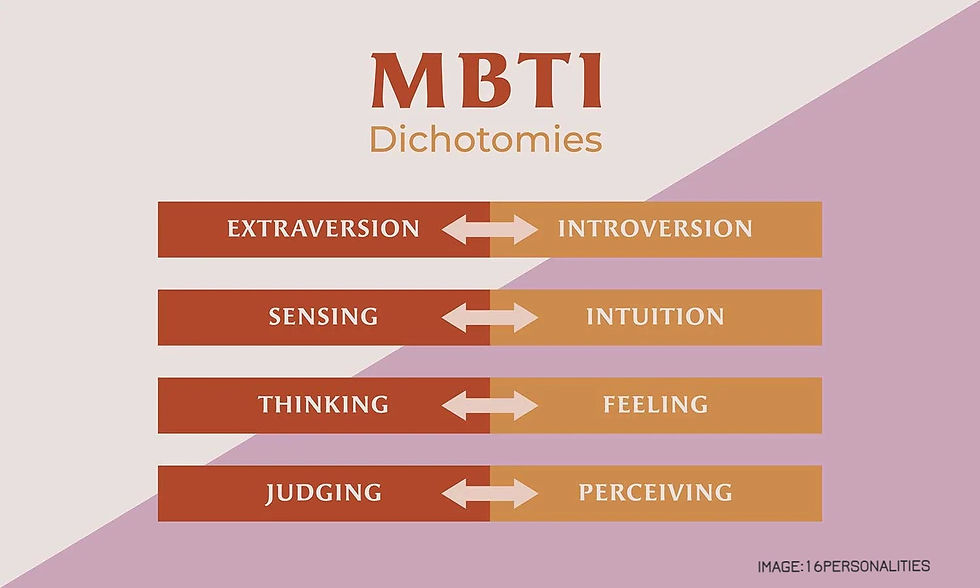EXPLORING PERSONALITY TYPES: UNVEILING THE MBTI AND ITS SIGNIFICANCE
- farhana shajil
- Apr 24, 2024
- 3 min read
Updated: Jul 5, 2024
"Have you ever found yourself in a conversation where someone casually remarks, 'Are you a T?' or 'Oh my, you're surely an F!' If you were a bit perplexed, let me explain: these are just shorthand references to one of the many characteristics of the 16 different personality types.
Just like each person has a unique DNA, our personalities also set us apart in countless ways. Yet, amidst this diversity, there are common threads that connect us. The Myers-Briggs Type Indicator (MBTI) captures these nuances by categorizing individuals into 16 distinct personality types.
It's a straightforward process: you invest a few minutes of your time, answer some questions honestly, and voila! The test analyses your responses to reveal your unique personality type. It's a fascinating exploration into what makes you, you!"
This framework classifies individuals into distinct personality types by examining four fundamental dimensions:

Energy Orientation: Extroverted (E) or Introverted (I)
Information Processing: Sensing (S) or Intuition (N)
Decision-Making Style: Feeling (F) or Thinking (T)
Engagement with the External World: Judging (J) or Perceiving (P)
To explore further on these 4 aspects, a simple click is all it takes!
"As a result, combinations of these four characteristics form the basis of the 16
different personality types, each with its unique label:
INTJ - Architect
INTP- Thinker

INFJ- Advocate
INFP- Mediator
ISTJ- Logistician
ISFJ- Defender
ISTP- Virtuoso
ISFP- Adventurer
ENTJ-Commander
ENTP- Debater
ENFJ- Protagonist
ENFP- Campaigner
ESTJ- Executive
ESFJ- Council
ESTP- Entrepreneur
ESFP- Entertainer
Curious about where you stand? Click
here to find out your type and everything you need to know about it!

IMAGE: MOUTH.COM
WHY THE HYPE?
The hype around personality typing, like MBTI, can be attributed to several factors. Firstly, it's enjoyable and intriguing to explore and understand ourselves better. Taking quizzes and learning about our personality types can feel like a journey of self-discovery, helping us uncover our strengths and weaknesses.
Moreover, knowing our personality type can provide valuable insights into how we interact with others and navigate different situations. It can offer guidance on personal growth and development, helping us make better decisions and communicate effectively with those around us.

Additionally, understanding the personality types of others can aid in forming connections and building relationships. While people with similar personalities may naturally get along well, there's also the fascination of how individuals with contrasting traits can complement each other. This idea that "opposites attract" adds an element of intrigue and excitement to the concept of personality typing.
Overall, the hype surrounding personality typing stems from its ability to offer self-awareness, personal growth opportunities, and insights into human relationships. It's a fun and engaging way to explore the complexities of human behaviour and connections.

iS IT RELIABLE?
The reliability of the Myers-Briggs Type Indicator (MBTI) is a topic of ongoing debate among psychologists and researchers. While some people find value in using the MBTI as a tool for self-reflection and understanding, others criticize its reliability and validity. The system may not be perfectly accurate. It has its pros and cons.
People with the same personality type can still act differently because personality traits exist on a spectrum. For instance, two individuals who are both classified as INFP in the MBTI may vary in how introverted or extroverted they are. One might lean more towards being very introverted, while the other might be introverted but display some extroverted tendencies. This variation is due to the fact that personality traits can be expressed in different degrees among individuals.
It's important to recognize that our responses to personality tests like the MBTI can vary over time. Despite the simplicity of the questions, our answers may change based on new experiences and insights we gain along the way. This fluidity means that we might not always receive the same personality type result when retaking the test. It's natural to question whether we're truly representing ourselves accurately, especially when faced with life's uncertainties. Thus, individuals taking the test at different points in their lives may indeed end up with different personality types, reflecting their evolving understanding of themselves and the world around them.
In the vast tapestry of human diversity, the Myers-Briggs Type Indicator (MBTI) serves as a fascinating lens through which we explore the complexities of personality. While its reliability may be subject to debate, the allure of understanding ourselves and others through personality typing persists. From uncovering our unique traits to forging connections with those around us, the MBTI offers a journey of self-discovery and interpersonal insight. As we navigate the ever-changing landscape of life, our understanding of ourselves may evolve, leading us to question and redefine our personality types. Yet, amidst this flux, the essence of personality typing remains a captivating endeavour—a mirror reflecting the complexity and richness of human nature